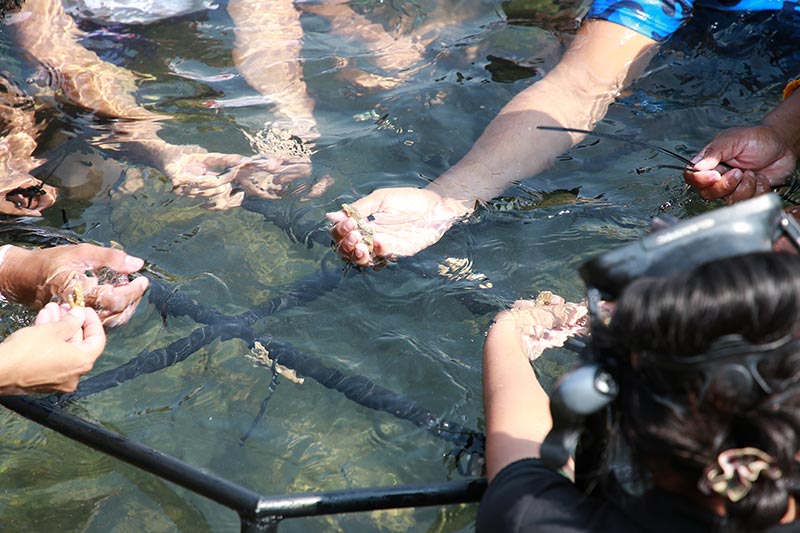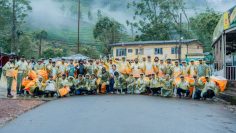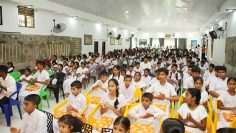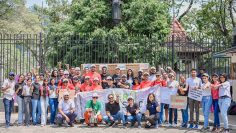
DIMO Successfully Concludes ‘Life to Reef’ Season 4, the Coral Reef Conservation Project in Rumassala
DIMO, one of the leading conglomerates in Sri Lanka, recently concluded “Life to Reef” – Season 4, the latest phase of the company’s initiative to restore and preserve corals in the world-famous Bonavista reef in Rumassala. DIMO has been a major advocate for Sustainable Development Goal #14 (Life below water) and has been spearheading this effort since 2017 together with the Wildlife and Ocean Resource Conservation (WORC) to restore and preserve corals in the Bonavista reef.
The Life to Reef Season 4 volunteer day event at Rumassala witnessed the participation of 28 DIMO Tribe members. Led by DIMO Group CEO Gahanath Pandithage, the volunteers supported in different capacities for the event, as divers, snorkelers and swimmers, attending from diverse business segments across the DIMO Group. The volunteers actively took part in coral planting and reef cleaning activities with corals tied up in cement plates where as many as 120 coral nubbins were planted 150 meters away from the shore. Nursery racks were taken to the deep waters by divers and deposited at the bottom of the sea while studying the growth of previously planted corals and how they have adapted to the ecosystem. The team also carried out a comprehensive cleaning program in the reef as well as the beach to mitigate the possible further damage from plastic pollution.

DIMO Chairman & Managing Director Ranjith Pandithage stated, “DIMO is excited to be a part of this important project for yet another year. As a responsible corporate, we are constantly seeking for ways to contribute meaningfully towards projects that have the potential to increase the biodiversity of the country and preserve them for future generations. The fact that this environment protection and biodiversity conservation program is aligned with the Sustainable Development Goal #14 (Life below water), as declared by the United Nations, makes it even more important to us. I am also thrilled to see the enthusiasm of the DIMO Tribe members who have actively participated for the season 4 of this project.”
Since its inception 4 years ago, a total of 2,500 nubbins have been planted while 6 artificial reefs have been created with nursery panels and steel racks visible at the sea bottom, promising continuous coral conservation activities. During this 4-year period, the project has so far restored more than 2,000 coral fragments while the area covered by the coral reef is now over 3.5 acres. To date, about 30 species of corals belonging to eight families have been replaced. With the continuous restoration of coral reefs, the number of coral species in the reef has increased to 60. At present, some coral species have grown to a height of about 20cm while being divided to grow into 30-35 branches.
According to a survey conducted by WORC, the number of butterfly fish species rose from 4 to 13 between 2017 and 2021, with 2 turtle species appearing on the reef in 2021. Three species of Angelfish belonging to the Pomacanthidae family can now be found in the reef which were not found in the coral reef in 2017. Such instances reveal the awakening of the reef due to the restoration work carried out. At the beginning of the coral reef restoration work, there were about 30 coral reef fish while today it has grown to a 160 and continues to grow.
In addition to the positive environmental impact, the project has also received strong support from the communities in the area as it has continued to demonstrate a positive social impact on improving livelihoods via generating income streams from enhanced tourist visits due to the reef coming back to life. Snorkel kit rentals and small food stalls targeting these tourists have been established by the communities, thereby helping to improve their quality of life. The DIMO volunteer team stepped forward to further strengthen and support these communities through a book donation for the nursery and primary children in the area. The Life to Reef project also focuses on educating people in the area on the importance of restoration and preservation of corals. This has been well-received by the communities in the vicinity as they now act responsibly in order to protect the coral reef and thereby their futures.
Globally, although corals cover only 1% of the ocean, they provide protective areas for 25% of sea animals. Until 1998, the Bonavista reef was recognised as one of the highest biologically diverse coral reefs and was considered a pristine marine environment to be carefully protected. Due to the El-Nino caused in 1998 and 2016, 95% of the live coral cover in the Bonavista reef was destroyed. With the objective of rebuilding the biodiversity of the Bonavista reef to the pristine level it used to be, DIMO initiated the ‘Life to Reef’ coral reef conservation and restoration project in 2017 with the technical support of WORC.






